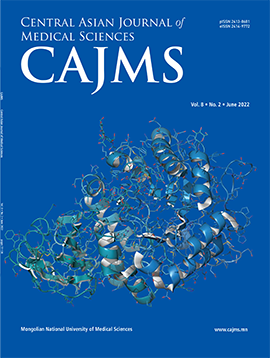Impact of IDH1 Mutation on Long-Term Survival in Patients with Diffuse Glioma
DOI:
https://doi.org/10.24079/cajms.2019.03.007Keywords:
Glioma, Isocitrate Dehydrogenase, Prognosis, SurvivalAbstract
Objectives: Diffuse brain gliomas are common primary brain tumor associated with a poor prognosis. In this study, we aimed to determine the impact of IDH1 mutation status on long term survival. Methods: Patients who underwent surgery for diffuse brain glioma were selected. Based on IDH1 mutation status, patients were separated into IDH1 mutant and IDH1 wildtype groups. Results: A total of 124 patients with diffuse brain tumor were included (mean age 39±17, 48.4% male). The frequency of IDH1 mutant and IDH1 wildtype were 56.5% (n=70) and 43.5% (n=54), respectively. During follow-up, 76 patients (61.3%) died and the median follow-up was 8 months (IQR 4; 16). Patients with IDH1 mutant more likely younger (36±16 vs. 43±17, p<.05) and had low grade (grade II) tumor (64.3% vs. 20.4%, p<.001). After adjustment of possible predictors, such age, gender, tumor location and surgical type, IDH1 mutant was an independent predictor of all-cause mortality (HR=0.43, 95% CI 0.26- 0.71, p<.001). Kaplan-Meier estimation showed IDH1 mutant is associated with longer survival compared with IDH1 wildtype in low grade tumor (log rank p<.001). Conclusion: Mutated IDH1 is an independent predictor of all-cause mortality in patients with diffuse brain glioma and resulted in longer survival compared with IDH1 wildtype.
Downloads
204
Downloads
Published
How to Cite
Issue
Section
License
Copyright (c) 2019 Mongolian National University of Medical Sciences

This work is licensed under a Creative Commons Attribution-NonCommercial 4.0 International License.




